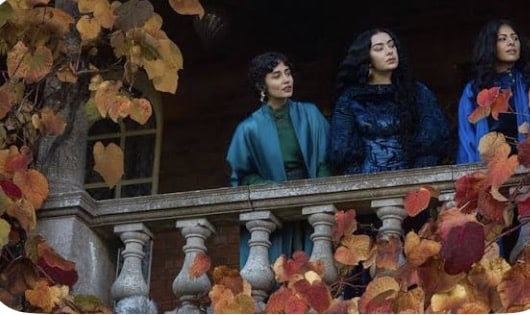


Dir: Julia Jackman | Cast: Emma Corrin, Nicholas Galitzine, Maika Monroe | US Drama 90′
Reviewed by Ian Long
100 Nights of Hero takes place in a gnostic-inspired universe created by the female deity Kiddo but subsequently hijacked by her male rival The Birdman, where powerful men enforce their dominance while wearing costumes which include birds’ skulls on their noses to signify their status.
In this alternate reality aristocratic Jerome, owner of a Tudor Gothic-style manor house or castle, has just married Cherry. They’re expected to produce an heir in short order, but he is keener on hanging out with his ‘handsome male courtiers’ than romping in the nuptial bed, and makes repeated excuses to avoid spending the night with his new wife.
So when Jerome goes off on a long trip he instals his friend Manfred, a hulking pretty-boy, in the castle, hoping that his aptly-named wife will be in the family way by the time he returns. Yet, despite fainting dead away when sly Manfred ‘innocently’ asks to look around her bedroom, Cherry remains unmoved by his overtures.
This is understandable as there’s no chemistry between Nicholas Galitzine’s strapping Manfred and Maika Monroe’s reedlike Cherry, which means that the endless will-they-won’t-they waltz which constitutes much of the film lacks any erotic tension. And this misstep is compounded by an early signposting of the fact that Cherry and Hero, her maid, will likely end up together.
It’s fine to construct a fairytale where a princess finds love with another girl – and one from ‘below stairs,’ at that! – rather than a handsome prince. But making the audience wait over an hour to see this happen when they know pretty much all along that it will is a bit of a problem.
100 Nights has many traits of farce, but lacks that genre’s crisp, relentless logic, drive and invention. In a well-constructed farce, Manfred and Cherry may have consummated (or not) their affair in short order and quickly gone on to solve other problems, or something else would have happened to complicate the proceedings. But here the narrative leaves Cherry’s character unmoored and lagging behind the audience (ironic in a story which clearly aims at restoring agency to its female characters).
This is perhaps the reason why Maika Monroe’s facial expression, frozen in a blankly affronted look, barely alters throughout the film – much like the virginal white of her outfits. Emma Corrin, at times eerily reminiscent of a young Jodie Foster, manages to find more nuance in the character of Hero, and Galitzine tries to make the most of his rather one-note character. Richard Grant also has a blink-and-you’ll-miss-it cameo.
The ‘seduction’ storyline is punctuated by a tale told to Manfred and Cherry by the Scheherazade-like Hero. It tells of Rosa and her three sisters, who fatally defy a proscription against women learning to read and write. But it isn’t enough to rescue the primary narrative.
Another problem is that there’s little risk or grit in the satire here. A good point of contrast is Neil LaBute’s In the Company of Men. Here, two men conspire in an even more misogynist way against a seemingly vulnerable woman. But in the earlier film, one of the schemers ends as collateral damage of the endeavour, while Jerome and Manfred seem to evade any serious consequences.
Company of Men was set in an all-too-real corporate environment which many people would recognise from their daily lives, emphasising the feasibility of its twisted plot. 100 Nights plays out in a world which feels overly skewed to bear its ‘message’, but where the story still doesn’t land any telling blows. At one point Hero accuses Manfred of being ‘smug’, which is true.
Unfortunately, a similar feeling of complacency hangs over the entire film.
100 Nights is clearly a very low-budget production, but this isn’t an excuse to skimp on story: in fact it should be a spur to create a narrative strong enough to redress other deficiencies. Unfortunately, though, even the moment of genuine dread which emerges as the film concludes is undercut when it’s revealed as a false ending, followed by an actual denouement which delves into a Care Bear level of pastel schmaltz. @_i_a_n_l_o_n_g_
VENICE FILM FESTIVAL | CRITICS WEEK 2025